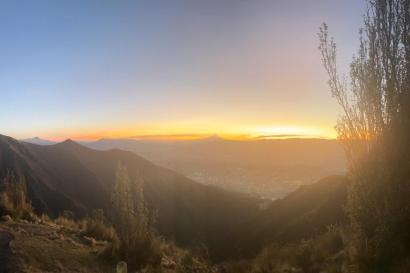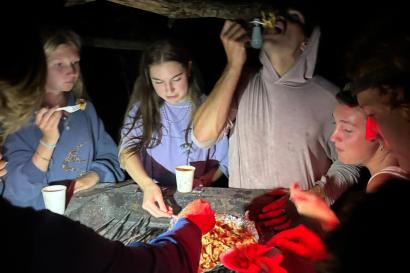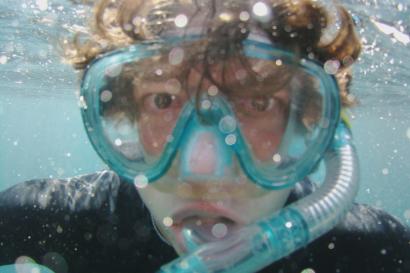Last saturday, I saw a waterfall that changed my outlook on life. It’s called El pailón del diablo, and it was, I suppose, a pretty standard example of a waterfall. It wasn’t the biggest or most powerful I’d ever seen (although my benchmark there is Niagara Falls, so I’m probably a little biased), and it wasn’t in a pure landscape, untouched by human hands: I was feeling the spray of the falls from behind a very clearly man-made stone guardrail, surrounded by tourists. Something about it, though, really spoke to me, and it put me in a daze that I still haven’t really come out of.
To understand how it changed my outlook, though, you should probably know that I have pretty bad ADHD. I’m constantly thinking, processing, stressing, or obsessing in a way that makes it very hard to relax. My brain is constantly in go-mode, which isn’t all bad—it definitely helps me come up with ideas for papers—but it’s also just inconvenient to deal with. A lot of the time I wish my brain could just chill out, even if only for fifteen minutes. It’s always been a hypothetical, though; I never really had an understanding of what it would feel like to just exist in a moment without my thoughts racing at a hundred miles a minute.
After being at the waterfall, I know what that feels like. And it’s incredible. I was overwhelmed in the best way by the roar of the waterfall, the feeling of the spray on my face, and the sight of it splashing down. Even with my eyes closed, the sensation was enough to stave off intrusive thoughts and just hold me captive in the moment, unable to analyze or interrogate the waterfall’s significance, solely capable of feeling it, of experiencing it. I stayed there, perfectly still, nothing in my head, for at least five, maybe ten minutes.
It was all I could do to open my eyes. Once I did, thoughts started trickling in—but as a trickle, not a torrent. I started thinking about the composition of the waterfall: hundreds of millions of individual drops of water, of molecules and individual atoms and things even smaller than that, and it just made me feel insignificant and small—but again, in the best way. It made me realize that everything I obsess about—grades, what my fifth grade class thought of me, my conceptions of what success is or should look like—doesn’t matter. That waterfall doesn’t care about me; it existed before me, and it will continue to exist long after I’m gone. It doesn’t care what I do with my life any more than the rest of the world. So why should I continue to hold unrealistic standards for myself?
I feel like at many schools there’s an implicit understanding that we, as students, should be willing to compromise our present mental and physical wellbeing in return for a promise of a better future for ourselves. Essentially, we invest our time and energy and vitality into our schoolwork with the implicit understanding that it’ll all be worth it after graduation because then we’ll be able to make money, or be “real people,” whatever that means. I can think of a hundred times I’ve expressed that sentiment in one way or another, whether it’s right after an all-nighter or talking about how “I can’t wait till grad school, so I’ll finally have time to work out.” Personally, I often expect myself to work for 60+ hours a week without pay (separately from the 20 hours I work for pay) in the hopes that the good marks I might get as a result will translate into “real-world” success in the form of getting into a good grad school.
But there is no “real world” as a separate institution from college, because we’ve been living in the real world since we were born. Seeing that waterfall helped me to understand the limits of the narrative to which I’ve subscribed to my whole life (“get good grades, work hard, it’ll pay off in the future”). It’s a vision of one path, out of many, which is often (especially in upper-middle class communities) portrayed as the only possible option.
I’m not saying that seeing a single waterfall is going to make me drop out of school or stop working hard, but rather that it’s helped me to understand that I am in school by choice, and that rather than breaking my back to meet all the requirements of my studies, it’s okay to choose classes that are better tailored to my needs, even if they might not look as good on a resume.
In thinking about this realization, I’ve also come to another conclusion: I never could have acknowledged the degree to which my struggles in school are voluntary while immersed in those same struggles. It’s hard for a person to accept that there are other paths than the one they’re on when they’re sacrificing so much (the aforementioned mental and physical wellbeing) just to keep going. In other words, if I just drank eight cups of coffee over the course of a night to finish a paper, I’m not going to willingly accept that that writing that paper was anything other than 100% vital for my continued existence.
Being abroad, surrounded by new people, places, and things, has given me the space I needed to decide to put myself before my schoolwork, and helped me realize that I’m in school because I want to learn, not because I want to get the best grades possible and beat everyone out to get into the top grad school. It’ll be cool if I happen to do well (empirically) in the process of my learning, but I’m really just out here trying to satisfy my curiosity.
And in a hundred years, regardless of what my grades were or what my career ended up being, that waterfall will still be there, carving its way through the rock over the course of millenia—so why does it matter what I do in my life, so long as I end up happy?

Louis Herman
Hi! I'm a current junior at the University of Rochester studying the history of early modern globalization, with a specific focus on links between Asia and Latin America. When I'm not busy writing papers, you can probably find me lying down on the beach, soaking in the sunlight, and reading sci-fi.








